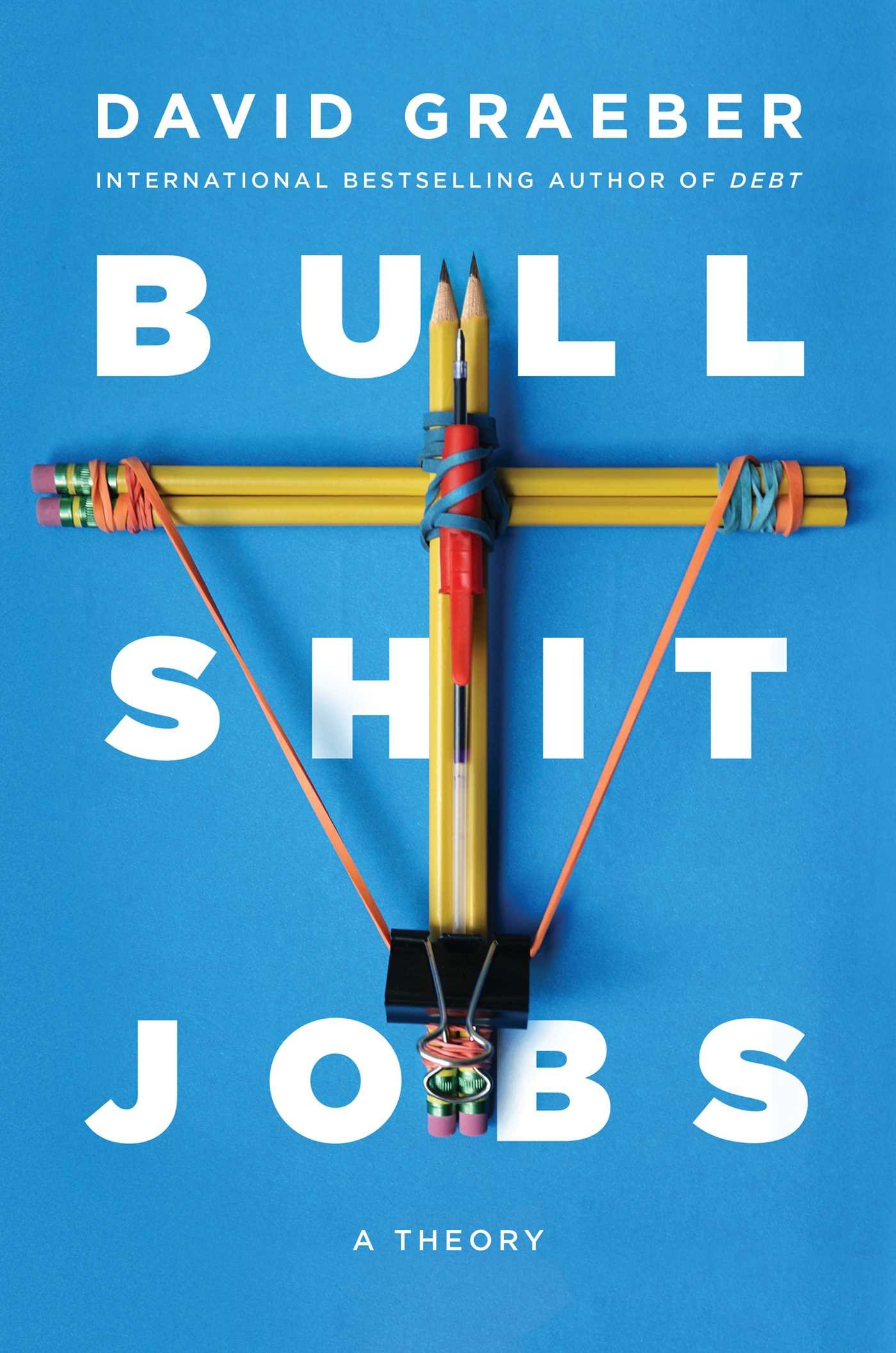
Punching the Clock
By David Graeber, from Bullshit Jobs, which was published last month by Simon and Schuster. Graeber is a professor of anthropology at the London School of Economics.
Everyone is familiar with the sorts of jobs whose purpose is difficult to discern: HR consultants, PR researchers, communications coordinators, financial strategists, logistics managers. The list is endless.
This is how Kurt, a subcontractor for the German military, describes his job:
“The German military has a subcontractor that does its IT work. The IT firm has a subcontractor that does its logistics. The logistics firm has a subcontractor that does its personnel management. I work for that company.
“Let’s say a soldier moves to an office two rooms down the hall. Instead of carrying his computer over, he fills out a form. The IT subcontractor reads and approves it and forwards it to the logistics firm. The logistics firm approves the move and requests personnel from us. I get an email to travel to the barracks. The barracks are up to three hundred miles away from my home, so I rent a car. I drive to the barracks, fill out a form, unhook the computer, load it into a box, and seal the box. A guy from the logistics firm carries the box to the new office. There, I unseal the box, fill out another form, hook up the computer, get a few signatures, drive back home, send a letter with the paperwork, and then I get paid.”
In 2015, YouGov, a polling agency, asked Britons whether they believed their job made a “meaningful contribution to the world.” More than a third—37 percent—believed it did not. (Only 50 percent said that it did; 13 percent were uncertain.) A more recent poll conducted in the Netherlands found that 40 percent of Dutch workers felt their job had no good reason to exist.
Our society values work. We expect a job to serve a purpose and to have a larger meaning. For workers who have internalized this value system, there is little that is more demoralizing than waking up five days a week to perform a task that one believes is a waste of time.
It’s not obvious, however, why having a pointless job makes people quite so miserable. After all, a large portion of the workforce is being paid—often very good money—to do nothing. They might consider themselves fortunate. Instead, many feel worthless and depressed.
In 1901, the German psychologist Karl Groos discovered that infants express extraordinary happiness when they first discover their ability to cause predictable effects in the world. For example, they might scribble with a pencil by randomly moving their arms and hands. When they realize that they can achieve the same result by retracing the same pattern, they respond with expressions of utter joy. Groos called this “the pleasure at being the cause,” and suggested that it was the basis for play.
Before Groos, most Western political philosophers, economists, and social scientists assumed that humans seek power out of either a desire for conquest and domination or a practical need to guarantee physical gratification and reproductive success. Groos’s insight had powerful implications for our understanding of the formation of the self, and of human motivation more generally. Children come to see that they exist as distinct individuals who are separate from the world around them by observing that they can cause something to happen, and happen again. Crucially, the realization brings a delight, the pleasure at being the cause, that is the very foundation of our being.
Experiments have shown that if a child is allowed to experience this delight but then is suddenly denied it, he will become enraged, refuse to engage, or even withdraw from the world entirely. The psychiatrist and psychoanalyst Francis Broucek suspected that such traumatic experiences can cause many mental health issues later in life.
Groos’s research led him to devise a theory of play as make-believe: Adults invent games and diversions for the same reason that an infant delights in his ability to move a pencil. We wish to exercise our powers as an end in themselves. This, Groos suggested, is what freedom is—the ability to make things up for the sake of being able to do so.
The make-believe aspect of the work is precisely what performers of bullshit jobs find the most infuriating. Just about anyone in a supervised wage-labor job finds it maddening to pretend to be busy. Working is meant to serve a purpose—if make-believe play is an expression of human freedom, then make-believe work imposed by others represents a total lack of freedom. It’s unsurprising, then, that the first historical occurrence of the notion that some people ought to be working at all times, or that work should be made up to fill their time even in the absence of things that need doing, concerns workers who are not free: prisoners and slaves.
Historically, human work patterns have taken the form of intense bursts of energy followed by rest. Farming, for instance, is generally an all-hands-on-deck mobilization around planting and harvest, with the off-seasons occupied by minor projects. Large projects such as building a house or preparing for a feast tend to take the same form. This is typical of how human beings have always worked. There is no reason to believe that acting otherwise would result in greater efficiency or productivity. Often it has precisely the opposite effect.
One reason that work was historically irregular is because it was largely unsupervised. This is true of medieval feudalism and of most labor arrangements until relatively recent times, even if the relationship between worker and boss was strikingly unequal. If those at the bottom produced what was required of them, those at the top couldn’t be bothered to know how the time was spent.
Most societies throughout history would never have imagined that a person’s time could belong to his employer. But today it is considered perfectly natural for free citizens of democratic countries to rent out a third or more of their day. “I’m not paying you to lounge around,” reprimands the modern boss, with the outrage of a man who feels he’s being robbed. How did we get here?
By the fourteenth century, the common understanding of what time was had changed; it became a grid against which work was measured, rather than the work itself being the measure. Clock towers funded by local merchant guilds were erected throughout Europe. These same merchants placed human skulls on their desks as memento mori, to remind themselves that they should make quick use of their time. The proliferation of domestic clocks and pocket watches that coincided with the advent of the Industrial Revolution in the late eighteenth century allowed for a similar attitude toward time to spread among the middle class. Time came to be widely seen as a finite property to be budgeted and spent, much like money. And these new time-telling devices allowed a worker’s time to be chopped up into uniform units that could be bought and sold. Factories started to require workers to punch the time clock upon entering and leaving.
The change was moral as well as technological. One began to speak of spending time rather than just passing it, and also of wasting time, killing time, saving time, losing time, racing against time, and so forth. Over the course of the eighteenth and nineteenth centuries, an episodic style of working was increasingly treated as a social problem. Methodist preachers exhorted “the husbandry of time”; time management became the essence of morality. The poor were blamed for spending their time recklessly, for being as irresponsible with their time as they were with their money.
Workers protesting oppressive conditions, meanwhile, adopted the same notions of time. Many of the first factories didn’t allow workers to bring in their own timepieces, because the owner played fast and loose with the factory clock. Labor activists negotiated higher hourly rates, demanded fixed-hour contracts, overtime, time and a half, twelve- and then eight-hour work shifts. The act of demanding “free time,” though understandable, reinforced the notion that a worker’s time really did belong to the person who had bought it.
The idea that workers have a moral obligation to allow their working time to be dictated has become so normalized that members of the public feel indignant if they see, say, transit workers lounging on the job. Thus busywork was invented: to ameliorate the supposed problem of workers not having enough to do to fill an eight-hour day. Take the experience of a woman named Wendy, who sent me a long history of pointless jobs she had worked:
“As a receptionist for a small trade magazine, I was often given tasks to perform while waiting for the phone to ring. Once, one of the ad-sales people dumped thousands of paper clips on my desk and asked me to sort them by color. She then used them interchangeably.
“Another example: my grandmother lived independently in an apartment in New York City into her early nineties, but she did need some help. We hired a very nice woman to live with her, help her do shopping and laundry, and keep an eye out in case she fell or needed help. So, if all went well, there was nothing for this woman to do. This drove my grandmother crazy. ‘She’s just sitting there!’ she would complain. Ultimately, the woman quit.”
This sense of obligation is common across the world. Ramadan, for example, is a young Egyptian engineer working for a public enterprise in Cairo.
The company needed a team of engineers to come in every morning and check whether the air conditioners were working, then hang around in case something broke. Of course, management couldn’t admit that; instead, the firm invented forms, drills, and box-ticking rituals calculated to keep the team busy for eight hours a day. “I discovered immediately that I hadn’t been hired as an engineer at all but really as some kind of technical bureaucrat,” Ramadan explained. “All we do here is paperwork, filling out checklists and forms.” Fortunately, Ramadan gradually figured out which ones nobody would notice if he ignored and used the time to indulge a growing interest in film and literature. Still, the process left him feeling hollow. “Going every workday to a job that I considered pointless was psychologically exhausting and left me depressed.”
The end result, however exasperating, doesn’t seem all that bad, especially since Ramadan had figured out how to game the system. Why couldn’t he see it, then, as stealing back time that he’d sold to the corporation? Why did the pretense and lack of purpose grind him down?
A bullshit job—where one is treated as if one were usefully employed and forced to play along with the pretense—is inherently demoralizing because it is a game of make-believe not of one’s own making. Of course the soul cries out. It is an assault on the very foundations of self. A human being unable to have a meaningful impact on the world ceases to exist.

